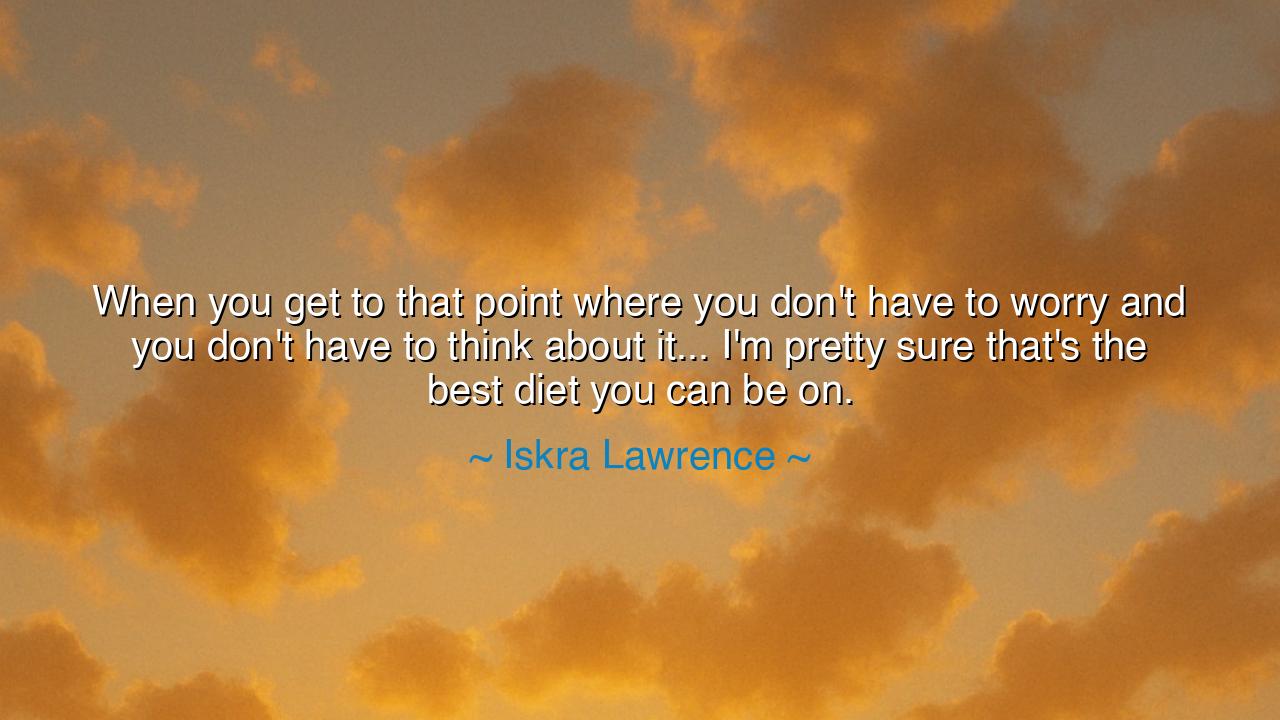
When you get to that point where you don't have to worry and you
When you get to that point where you don't have to worry and you don't have to think about it... I'm pretty sure that's the best diet you can be on.






When Iskra Lawrence said, “When you get to that point where you don't have to worry and you don't have to think about it... I'm pretty sure that's the best diet you can be on,” she was not speaking merely of food, but of freedom — the liberation of the mind from the tyranny of obsession. Her words echo with quiet power, for they point to a truth that the ancients knew well: that health is not found in control, but in balance, not in restriction, but in harmony. She describes a state not of indulgence or deprivation, but of peace — a moment when body and mind are no longer at war, when one lives so attuned to nature and self that nourishment becomes effortless.
In every age, humanity has wrestled with the question of moderation. The philosopher Epicurus, often misunderstood as a man of pleasure, taught that true pleasure comes not from excess but from simplicity — from being content with what sustains you. To eat without fear, to move without guilt, to live without self-punishment — that is the essence of Iskra Lawrence’s teaching. She speaks of a “point” that can only be reached through understanding oneself, a state where choices are no longer battles but natural expressions of wisdom. This is no small victory. For many, the body becomes a battlefield, the table a place of anxiety. But when awareness replaces obsession, and care replaces control, the human being reclaims their natural state of peace.
The ancients called this eudaimonia — the flourishing of the soul when it lives in harmony with itself and the world. In Iskra’s words, this harmony manifests as an intuitive relationship with the body — a diet not of rules, but of rhythm. To not “have to think about it” does not mean carelessness; it means one has cultivated such understanding that the right choices flow effortlessly. It is the same ease that the master musician feels when fingers dance upon the instrument without thought, or the archer who releases the arrow without tension. Discipline becomes instinct, and instinct becomes grace.
Consider the story of Bruce Lee, the martial artist and philosopher who spoke of becoming like water — formless, adaptable, natural. He trained his body to perfection, yet rejected rigidity, saying, “Absorb what is useful, discard what is not, add what is uniquely your own.” So too does Iskra’s wisdom flow from that same ancient current. The best diet is not a fixed doctrine, but a living practice, one that changes and evolves as the self does. When one learns to listen — truly listen — to the body’s whispers rather than society’s shouts, one finds what is useful, what nourishes not only the body, but the spirit.
Her words also strike at a deeper illness of our age — the obsession with perfection, the ceaseless worrying about appearance, numbers, and approval. To “not have to worry” is to be free from the endless noise that tells us we are never enough. In that freedom lies the true meaning of health. The ancient Stoics would have admired this perspective, for they taught that peace is found not by changing what we eat or do, but by changing how we think. The one who eats with calm gratitude digests more joy than the one who eats with guilt and fear. Iskra’s diet, then, is not merely physical — it is spiritual. It is the diet of the soul that feeds on acceptance and self-respect.
Her teaching is also a call to trust — to trust the body’s wisdom, the intuition that centuries of noise have taught us to ignore. The ancients believed that the body was a sacred vessel, guided by nature’s intelligence. The Roman physician Galen wrote that health is not achieved through harshness, but through alignment with one’s inner nature. To find that point, as Iskra describes, is to reach unity between what the mind desires and what the body needs. It is a quiet, powerful kind of knowing — one that cannot be forced, only cultivated.
Let this, then, be the lesson: seek not the perfect plan, but the peaceful rhythm. Listen more than you command. Eat with gratitude, move with joy, rest without guilt. Do not wage war against your own body, for it has always been your ally. To live without worrying about what you consume is not ignorance — it is mastery. It means you have learned what sustains you, and you honor it without question.
Thus, as Iskra Lawrence reminds us, the best diet is not a restriction, but a relationship — one built on trust, respect, and peace. When you reach that sacred point where nourishment flows naturally, where you no longer count or compare but simply live well, you have achieved something far greater than fitness: you have achieved harmony. And in that harmony, the body thrives, the mind rests, and the soul finally remembers its ancient truth — that health is not a struggle, but a state of grace.






AAdministratorAdministrator
Welcome, honored guests. Please leave a comment, we will respond soon